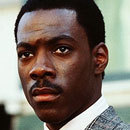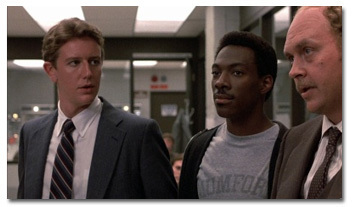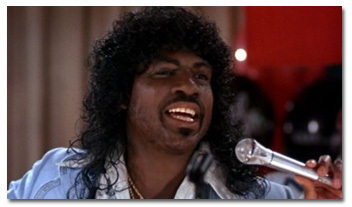The 8 Greatest Eddie Murphy Movies of All Time

We asked some of your favorite Cracked writers to pick their favorite Eddie Murphy movie, and defend their picks in a sudden-death, no-holds-barred cage match of thoughtful, comedy enthusiasm. Below, they go toe to toe and duke it out ... OK, there's nothing violent going on here. Just comedy writers talking about a funny guy's funny movies. It's just more exciting when you describe it as a fight.
In no particular order ...
Beverly Hills Cop -- Gladstone

The story goes that Beverly Hills Cop was originally going to be a Sylvester Stallone vehicle. You can kind of see that, right? A tough Detroit cop must solve a case in ... BEVERLY HILLS! It's the kind of high-concept comedy that writes itself, but the thing is, typically it writes itself into something that sucks. A movie with lots of shots of Axel looking out of place in fancy hotels and galleries and country clubs. And those scenes are all still there, but when you remember the movie, it's not the premise that sticks with you; it's the performances.

Particularly that of child prodigy Judge Reinhold.
Case in point? The scene where Eddie checks into the hotel where he has no reservation by pretending to be a Rolling Stone reporter. That is unadulterated Murphy schtick in its purest form. But the performance is not all histrionics and gesticulations. The funniest part comes when Eddie connives his way into a room, but is still stuck with a $235-a-night rate (and that's in 1984) that he can't afford. The silent scream in his eyes is funnier than any further haggling could have been. It's so effective that I remember worrying how he'd afford the room the whole movie and feeling a sigh of relief when the police department picks up the tab for him at the end of the film.

Even Eddie Murphy's expressions count as plot points.
And look how well Eddie plays with others in this movie. Despite all the heavy lifting he does to inject humor, such as telling the chief that Taggart and Rosewood are "super-cops" or pretending to be bad guy Victor Maitland's STD-infected lover, he stands back to let other comedic gems shine. Bronson Pinchot has the role of his life doing his nondescript Eurotrash accent as Serge in the gallery, and Damon Wayans somehow makes selling bananas memorable. Everyone is funny in this movie. Paul Reiser as Jeffrey, John Ashton as Taggart and Judge Reinhold as Rosewood. All funny. Eddie has never been better as both a brute comic force and the straight man for others in one role.

SEXUAL Chocolate! Those two words are an expressway to victory for anyone who enters into a debate concerning the greatest Eddie Murphy movie of all time. Did Randy Watson and his band of soul show up in, say, The Golden Child or Delirious? Nope. Those fictional funk masters, fronted by a top-of-his-game Eddie Murphy, only surface in the universally beloved comedy juggernaut that is Coming to America, and it's the funniest bit in a movie that's made of approximately 103 percent funny.

It tells the story of a spoiled African prince hoping to find true love in America. As the African prince who heads to New York City in search of a wife whom he can respect for her intelligence and lack of gold-digging prowess, Murphy's performance was the Michael Jordan that turned his sidekick into a comedy Scottie Pippen. Remember Arsenio Hall? Sure you do. Now go watch Coming to America and you'll remember why (with all due respect to that talk show of his).

You see, they're not from around here.
Eddie Murphy brought out the best in everyone in that cast. We're talking James Earl Jones as Murphy's overbearing father and Good Times dad John Amos as Cleo McDowell in performances that can only be described as dy-no-mite!! -- provided you literally have no other way to describe them.
Sure, Coming to America has its share of spandex fashion and Jheri curl jokes, but even 30 years later, this quintessential '80s movie stands the test of time.
The Golden Child -- Robert Brockway

The Golden Child was the first movie I ever saw where the star clearly did not give a f#@%. In fact, I think Eddie Murphy may have actually invented the concept of not giving a f#@% just for the film. And it was wonderful!

"Which one of these am I in right now?"
The whole inspiration for Eddie Murphy's character in The Golden Child was to laugh in the faces of the Hollywood executives who wanted to put Eddie Murphy in a supernatural crime-thriller. He spent the entire runtime of that movie giggling and screwing with everything, from the set pieces (I *wicky-wicky-wicky* I waaant the kniiiife) to his fellow actors (you look in Tywin Lannister's eyes in the scenes he shares with Eddie, and you tell me that frustration is feigned).

"Cut! Dial it back, Ty. It looks like you're literally trying to murder him with your eyes. Ty?"
At the height of coked-up 1980s movie studio insanity, a producer came along and said "We'd like you to be in our movie, Eddie; you're gonna fight the devil!" Any comics taking themselves too seriously would have said "Ha! That's dumb. I won't do it!" But not Eddie Murphy; he said "Ha! That's dumb. I'll absolutely do it!" And then he proceeded to have what looks like the most fun I've ever seen on a Hollywood set, transforming an otherwise unremarkable little action flick into a completely charming, unforgettable character comedy.
Trading Places -- Luke McKinney

Trading Places satisfies one of the conditions for the best Eddie Murphy comedies: playing a character who's a fish out of water.
But while his other roles had hidden assets like "secret African fortune" or "the ability to use a gun near white police officers without getting shot," here Murphy pure fast-talks his way into millions of dollars. That's not just his character; that's his real career, too. In one scene, he masters the complexities of futures trading by doing stand-up at it.

We understood "Sell, sell, sell!"
His perfect foil is Dan Aykroyd, also playing his quintessential role: socially maladjusted white guy who's partly insane. My favorite scene is Aykroyd, newly restored to wealth, calmly polishing a brace of shotguns to blow the kneecaps off the evil Duke brothers, while Murphy matter-of-factly explains why you can't do that. The spoiled rich kid and street-smart conman capture their entire characters in one line each. This isn't just a movie; it's a time capsule of two brilliant comedians.

Take special note of the pre-Dragnet Aykroyd.
Two more reasons this is my favorite Murphy movie: 1) Jamie Lee Curtis' breasts (which isn't very intelligent, but I wasn't very intelligent when I first saw them) and 2) the movie's Fight Club-level audience mindjob, drawing you into the con of the plot. We all love Eddie so much that we think he's a good guy. He commits absolutely massive securities fraud. Sure, he does it by stealing the crop report already stolen by the evil Duke brothers, but we don't think "They started it!" is a legal defense for market manipulation. They devastate an entire area of investment, bankrupting countless anonymous stockholders, and sentence a man to lifetime rape-by-gorilla, and you still love them. Because Eddie Murphy is just that good at talking.
48 Hrs. -- Soren Bowie

In his very first film role, Eddie Murphy pioneered a genre. 48 Hrs. set the tone for every other buddy-cop action movie in which the buddies privately hate one another and sometimes punch each other in the face. Lethal Weapon, Tango and Cash, Rush Hour, Bad Boys and just about every other movie where a no-nonsense cop reluctantly teams up with a smartass owe their existence to 48 Hrs.

"There's just so much character conflict!"
But the movie's success is almost directly attributable to Eddie Murphy. While Nick Nolte is good as a surly, jaded detective, moviemakers figured out pretty quickly that, in the blueprint for Eddie Murphy cop movies, the partner is interchangeable. The Beverly Hills Cop franchise, for instance, is just a variation on the same formula someone discovered with 48 Hrs.

Caught on film: The exact moment Nick Nolte became expendable.
It's ironic then that the first movie proving that Eddie Murphy could be paired with any nameless white cop(s) contains so much generality and overt racism against black people that entire scenes are missing when it shows up on basic cable. Nolte's character is very careful about not letting a single epithet slip through the cracks, calling Murphy everything from "spear chucker" to the more confusing "watermelon." But all that bigotry only makes the most iconic scene of the movie that much more enjoyable: Eddie Murphy schools an entire bar full of cowboy rednecks by mocking their accents, their silly hats and their ignorance. It's enormously gratifying to watch him command control of a room where everyone could literally hate him to death. He insults them so hard that they're too disoriented to fight back. That scene is a testament to the fact that Eddie Murphy never needed chemistry with anyone else on camera; he could carry an entire scene by himself and make us love him for it.

DONKEY! Everyone loves Donkey. Kids, adults, whatever's between kids and adults. Heck, even Shrek loved Donkey, and he hated everything and everyone. You can say it was Fiona, but Donkey is the one who finally warmed Shrek's heart. And that was all thanks to the vocal talents of the great Eddie Murphy. He was not only hilarious, but he also gave us some truly heartfelt moments that made us want to hug Donkey and punch Shrek. Or, in our darkest moments, to donkey-punch Shrek.

"Wait, Donkey, we've changed our minds."
It was Eddie Murphy's erratic, hyperactive vocal stylings that made Shrek a hit. Kids didn't flock to the theater over and over because they thought Mike Myers did a great Scottish accent and couldn't wait to watch the green guy go through some significant character development. They went because a talking donkey named Donkey said funny things in a funny way. In the way only Eddie Murphy could say them. Murphy has made a career of being a living cartoon, often playing multiple characters in the same film. Each character has a different voice, but they all have the same basic quick-talking, hyperactive energy. Unbeknownst to him, Murphy's career had been training him to be the voice of one of the most popular cartoon characters ever in one of the most successful animated franchises of all time.

He was Donkey the whole time.
There's a reason Donkey is No. 21 on Empire's list of 50 Best Animated Characters and Shrek is nowhere to be found. Because Eddie Murphy's Donkey stole the show, like Eddie Murphy's characters always do. He's simply the best. That'll do, Murphy. That'll do.
Delirious -- Kristi Harrison

22. Eddie Murphy was 22 years old when he recorded the 1983 stand-up special Delirious. Sometimes we forget that when you're talking about Eddie Murphy, you're talking about a prodigy, like Mozart, or the band Prodigy, but if they were younger. At an age when most of us are filling out our first Wendy's applications while Mom and Dad mail out the college graduation invitations, Eddie Murphy held the whole country in the palm of his dazzling, hilarious hand. Delirious was the moment when Eddie Murphy took America to the back room and made sweet but nasty love to her for 70 whole minutes.

"Hey girl."
And here's the thing: We can watch Eddie be Eddie delivering other people's lines, and he's going to do a good job, because he's Eddie. He's entertaining to watch. I'll sit here and wait all day for you to name another stand-up comedian who transitioned to movies as successfully as Eddie Murphy.
(Eight hours later.) But Delirious was the first (and maybe best?) time Eddie gave us his own lines -- and they're good. This is Murphy before he grew up. This is the kid who saved Saturday Night Live with the sheer force of his personality, who could nail everyone from Elvis to James Brown and talk about Stevie Wonder like Stevie Wonder was a back alley hobo. Who does that? Besides members of the Stevie Wonder Is Secretly a Back Alley Hobo Society, I mean?

Name any other great stand-up comic, or plain ol' comedian for that matter, and there's a good chance the guys (or guy-ladies) had at least a decade of experience under their belt before the camera ever caught them in action. And none of them, not one, is going to bring you the poetry of the Ice Cream Song and Dance. Which I will do to this day if you give me some ice cream.
Wanna lick??? PSYCH!
Raw -- John Cheese

I was 13 years old when Eddie Murphy released his second standup feature, Raw (also known as "not the red leather outfit -- the blue one"), and it single-handedly changed the way I thought about comedy. In that set, he used the word "fuck" 223 times, which landed it in a spot on top of the hidden porno magazines in every teenage boy's bedroom. It was the crudest stand-up set I had ever seen, and without it, my writing would be much different from what it is today. No one did it better. Not George Carlin. Not Bill Hicks. No one. Raw defined how a feature comedy film should be paced, delivered and edited. It was perfect.

We did feel mildly cheated that he didn't once dance with zombies.
If you ever think about getting into stand-up and you want to see how the masters do it, look up Murphy's story about the time Bill Cosby, whom he had not yet met, called him to give him a lecture about his use of profanity. Or the last 10 full minutes of Raw, where he does an impression of his drunken father that starts off as the vulgar, ridiculous rants of a drunk and then slowly transforms into a surreal landslide of bullshit, which includes his father recounting his childhood where they had to eat cakes made out of Etch-A-Sketches and wear suits made out of Twister mats.

And there was no icing for the cakes.
The man made profanity an art form, but the most impressive part about Raw is that if you take away all of the "fucks," "shits" and "pussies," it's still just as funny. That is the mark of true genius.